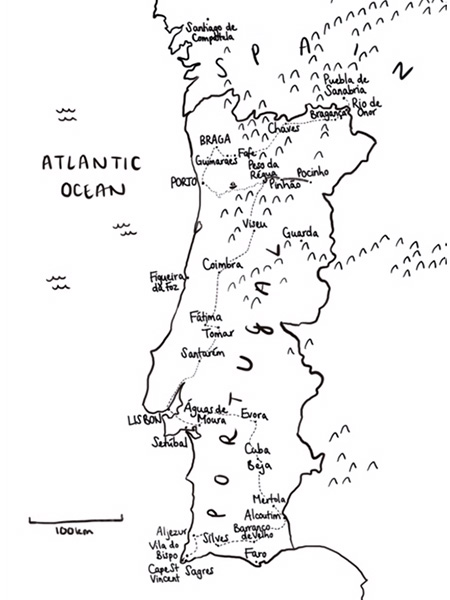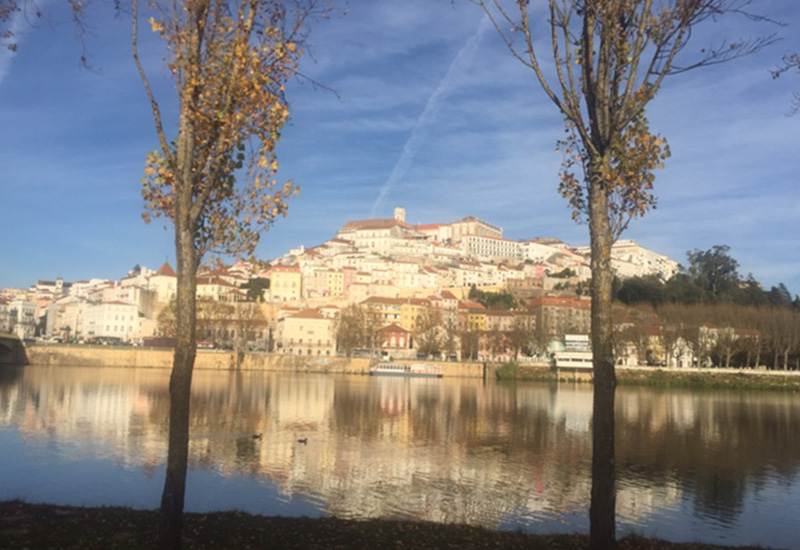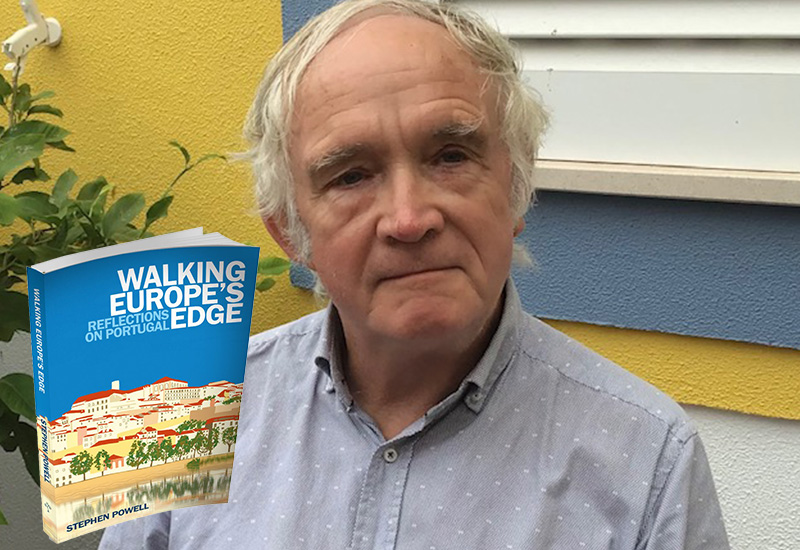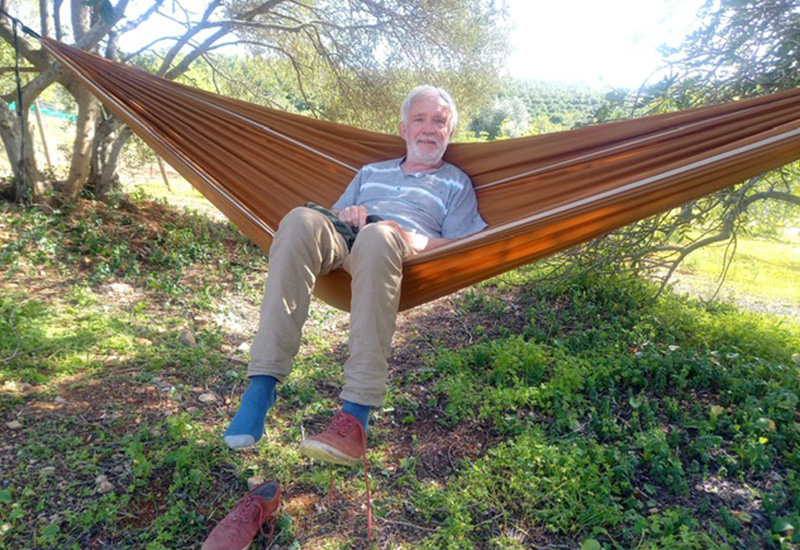Stephen Powell worked as a Reuters journalist for 27 years. In semi-retirement, from autumn 2018 until spring 2019, he walked the length of Portugal from north to south, nearly 1,500 kilometres. He now lives and writes in the Algarve.
After living and working on every continent (except for Antarctica), how do you explain the pull to Portugal?
Motivation can be hard to fathom. My walk through Portugal began in my head as a journalistic assignment. At the outset, I had no intention of moving to the country. My best analysis is that a deep preference for warmth and change uprooted me from Wales and pulled me to Portugal. When I talk about warmth, I’m thinking about both the climate and the people! The move has been a real change but not an absurdly radical one. I tell myself that I have moved from one part of the Roman world to another.
What were your best and worst experiences during your Portugal walk?
I had a lot of good experiences – I met kind people at every stage. One memory that stands out is meeting a retired Swiss sea captain in Aljezur. He radiated happiness. He loved his life in Aljezur and I think we are all moved when we encounter a blissful fellow human. It feeds hope. My worst experience was my own fault, over-indulging in sangria in Porto and needing a few stitches in my head after a fall.


What else do you do when you’re not hiking or writing?
I read a lot – it goes with the territory of being a writer. I travel. I am just back from two weeks in Sicily which I adored. In Sicily, you go back to the ancient world with such ease. The cathedral of Syracuse, a living place of worship, contains Greek columns put up in the fifth century BC. Amazing! I am a person of enthusiasms, but I do think everyone should see Sicily. D. H. Lawrence was so smitten by the beauty of Taormina, under the shadow of Etna, that he stayed for three years.
Otherwise, I like chilling with those who are dear to me, preferably over a glass of wine, cooking, visiting food markets and planting trees. Oh, and some Tai Chi these days.
You have already published two books, The First Toast is to Peace, Travels in the South Caucasus (2018) and Walking Europe’s Edge, Reflections on Portugal (2021). What is your next project?
I want to go to Mozambique and write about that. I speak Portuguese and that should help communication. I think the country is under-reported and everyone tells me the coast is sublime.
What is your message for readers of Tomorrow?
I do accept the view put forward by a number of scientists and spiritual teachers that humanity is at a crunch time. Those of us alive now have the privilege and the responsibility of being around at probably the most important period in human history. After many years of trashing the planet, our species is at a crossroads.
Recently I watched a video interview with the writer Robert Temple, author of The Sirius Mystery. He talked about humans being on the border between great creativity and madness. It is clear to all of us that we have sublime music, literature, and architecture, but we can kill one another by the tens of millions. What will come next? For me personally, it makes sense to be hopeful and to avoid fear. But I take issue with the advice of some spiritual teachers: “Don’t watch the news.” Democracy is fragile and surely it functions best with voters who are informed. I would say, “Watch the news with discernment, don’t let the bad stuff overwhelm you. Keep your faith in a positive future and use the gifts given to you to make the world better. Create joy.”

Book Review: Walking Europe’s Edge: Reflections on Portugal, by Stephen Powell
In J. R. R. Tolkien’s The Fellowship of the Ring, there is a poem that starts with the words: “All that is gold does not glitter, /Not all those who wander are lost”. After reading Walking Europe’s Edge, I fully understood the meaning of John Ronald Reuel’s second line: Mr Stephen Powell is way too far from being lost; he is rather a traveller who is constantly on the move to somewhere new and interesting.
“Sometime in the mid-afternoon, I entered a Spanish village that seemed dead as a doornail. Without any announcement at all, beyond some bunting strung above the road, this sleepy settlement turned into a Portuguese village. On the Portuguese side of the border there were some signs of life – a café with tables and chairs outside offered the chance of a beer and conversation with the locals. This is an unusual village. Astride an international border, it has to cope with two time zones. When I arrived in September it was GMT+2 on the Spanish side, Rihonor de Castilla, and GMT+1 on the Portuguese side, Rio de Onor.”
This was the auspicious beginning of a life-changing adventure. It is a fair guess to say that five years ago, before travelling on foot the length of Portugal, Mr Powell didn’t know he was going to settle here. The fascinating people and places he met must have changed something inside him and had contributed to this decision.
If I can be sure of one thing after reading Walking Europe’s Edge, it is that even the most idle homebodies will have a sense of desire to go backpacking. This is much more than a travel memoir. It is a life-exploring tale about the joy of being at one with the sheer universe, and each chapter is flavoured with endearing reflections on imperial and modern dynamic Portuguese historical facts, on depressing rural emptiness, then on politics and the incredibly welcoming environment. The reader is also invited to acknowledge that walking is accessible to everyone, being maybe the easiest way to get more active, cleanse the mind and the nervous system, lose weight and become healthier.
For, being a small book (less than 200 pages), it is a miracle how many comprehensive new experiences it includes. That is why I recommend it as a must-read for anyone who has anything to do with Portugal: locals, foreign residents, visitors, journalists, sociologists, or those who just want to improve their general knowledge of Europe’s southwestern edge.
“Don’t judge a book by its cover,” so the saying goes, but this time I shall do it: it is a great choice. I have a soft spot for 5-star books with 5-star first covers, and Walking Europe’s Edge is one of them. I was told that Megan, one of Stephen’s daughters, designed the cover using a picture taken by the author himself while walking through Coimbra.
If, after this wordy consideration, you want to discover Stephen Powell’s Walking Europe’s Edge by yourself, find it on Amazon.es for 20.41€ (paperback) or Amazon.co.uk from £3.99 (Kindle edition) up to £10.99 (paperback).
Dan Costinas: “There are no good or bad books; some resonate more with certain minds, while others resonate with others. Therefore, I am not entitled to tell anyone what they should and shouldn’t read. What I do is invite you to ponder whether this or another book resonates more with your mind. It’s as simple as that.”
About Stephen Powell
An Oxford University graduate and multilingual Welsh-born journalist and writer, he loves the open roads and enjoys the challenge of long travels. His choice was to retire in the sunny Algarve.













